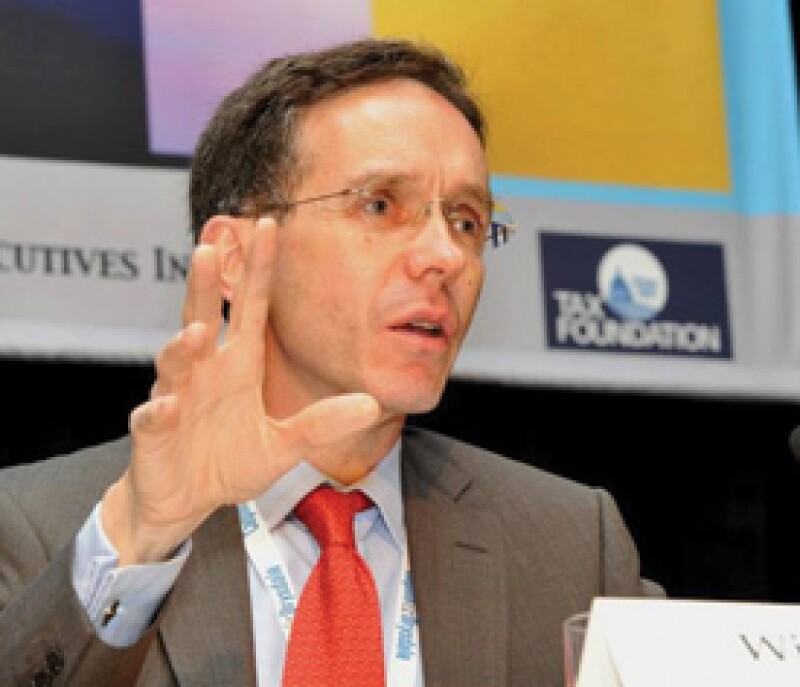
|
It has been a busy year for Will Morris who has been heavily involved in the OECD's BEPS project. Here he talks to ITR about presenting the views of business on a united front before the OECD, battling ambitious timetables and the importance of narrowing down the scope of the BEPS work to achieve success.
International Tax Review: What has your greatest achievement been this year? What are you most proud of?
Will Morris: I'd say my greatest achievement – although I need to emphasise very strongly that it has totally been a team effort – has been largely keeping the business community together and all on the same page. Managing to produce consensus BIAC comments on the papers which came out in the first stage of BEPS was a good outcome. I was surprised this happened, but everyone pulled together. This doesn't mean there is agreement on everything but it does mean we are a more effective voice.
This achievement was largely down to open communication, making sure that everybody felt they had a real voice in the process, and getting to what the heart of the issues were. As I said it has been a huge team effort. The fact that the project was driven by lots of people from lots of different countries, and not just one or two people, has made for a much better project.
ITR: What has been the biggest challenge for you this year?
WM: The biggest challenge for me this year has been keeping the business community together, and keeping the channels of consultation with OECD and national governments open. It is very much the flipside of the achievement. Keeping the lines of communication open with business and OECD was a considerable challenge, given how tight the OECD BEPS timetable is. There has been a huge amount of work to do over a very short period of time. This puts pressure on people and means they don't often have the time to talk. Part of my job has been to convince people that they do still have time to talk and that it is time well spent.
ITR: What were the issues that concerned you most this year?
WM: The issues that have concerned me most this year all relate to the BEPS timetable with everything having to be done in such a short time. This has had an effect on the scope of some of the projects. For example, it was clear in the hybrids project that the original scope did not take account of the use by banks of regulatory hybrid capital.
ITR: Have these issues been resolved? What more needs to be done?
WM: I give real credit to the OECD for realising that some items needed more work. I think what we saw with phase one of BEPS was that a number of difficult issues were allocated more time for resolution. The OECD have given themselves another six months to deal with some aspects of hybrid mismatches, which will allow more time to work out implementation details. The same is true on country-by-country reporting. But time and scope remain a challenge. The big projects this year will be interest deductibility, permanent establishment and intangibles. We need to focus on what the problems really are so that we can bring all our energies together to reach a targeted, workable solution rather than to try and answer every conceivable question.
ITR: What do you feel have been the most significant tax related events this year? Why?
WM: It has to be the BEPS project and the release of the papers. The fact that there continues to be, at G20 level, a significant amount of political support for this project means the tax landscape really has changed. I don't think you can overstate the significance of that. Tax, as a policy issue, is now of broad political and public concern. And that is here to stay.
ITR: What do you think should be the main focus next year? What do you hope to see happen?
WM: Obviously, BEPS. We need to look into whether we can get the scope of the projects narrowed down so that we can achieve success in the areas where we really need to achieve success without trying to do too much.
As BIAC (and business more generally) we need to ensure we are talking to the OECD and governments, encouraging them to come up with consensus recommendations, and preventing unilateralism. I worry about fatigue in the business community with the intensive engagement that BEPS demands. But we do need to stay engaged to make sure that the recommendations are not only targeted, but are also technically sound and, most importantly, promote rather than inhibit cross-border trade and investment. And I'm going to do my best to ensure that engagement continues!
The Global Tax 50 2014 |
||
|---|---|---|
| Gold tier (ranked in order of influence) 1. Jean-Claude Juncker 2. Pascal Saint-Amans 3. Donato Raponi 4. ICIJ 5. Jacob Lew 6. George Osborne 7. Jun Wang 8. Inverting pharmaceuticals 9. Rished Bade 10. Will Morris Silver tier (in alphabetic order) Joaquín Almunia • Apple • Justice Patrick Boyle • CTPA • Joe Hockey • IMF • Arun Jaitley • Marius Kohl • Tizhong Liao • Kosie Louw • Pierre Moscovici • Michael Noonan • Wolfgang Schäuble • Algirdas Šemeta • Robert Stack Bronze tier (in alphabetic order) Shinzo Abe • Alberto Arenas • Piet Battiau • Monica Bhatia • Bitcoin • Bono • Warren Buffett • ECJ Translators • Eurodad • Hungarian protestors • Indian Special Investigation Team (SIT) • Chris Jordan • Armando Lara Yaffar • McKesson • Patrick Odier • OECD printing facilities • Pier Carlo Padoan • Mariano Rajoy • Najib Razak • Alex Salmond • Skandia • Tax Justice Network • Edward Troup • Margrethe Vestager • Heinz Zourek |
||









